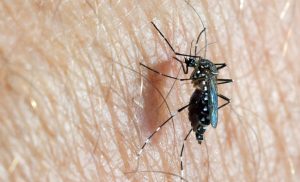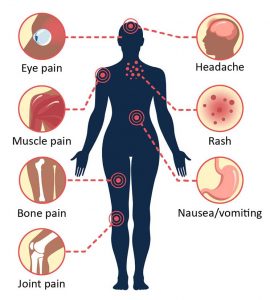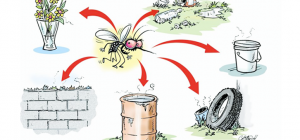Dengue is a disease that has persisted in some areas of the world since a long time. However, now, due to several factors of resistance and temperature changes, it has spread to a multitude of new areas. That is why it is extremely important for us to understand its symptoms and how we can keep ourselves protected against it. Because who knows? You and I could easily be the next victims! Have you been having fever, joint pains and rashes? Could it be that someone close to you has dengue? Want to know more? Don’t worry! We’ll tell you.
Cause
You may already know that dengue is a mosquito-borne disease. However, did you know that it isn’t actually only the mosquito which is responsible for causing it? There are actually four dengue viruses (DENV) which cause dengue. And did you know that not all species of mosquitoes transmit dengue? Yes, in fact it is only a specific species called as the Aedes Aegypti which transmits dengue. Rarely, the Aedes Albopictus mosquito may transmit

it too. The mosquito majorly bites during the day, approximately two hours after sunrise and a few hours before sunset. However, it can bite during the nighttime as well. It usually approaches people from the behind and bites on the ankles and elbows.
A few centuries ago dengue was only seen in monkeys. Unfortunately, today humans are also affected. When a mosquito feeds on the blood of an infected person, the virus is transferred to the mosquito. The virus replicated within the mosquito. The virus is then transmitted to another person when the mosquito bites him. In such a way, the person gets infected by the dengue virus. This cycle goes on and on until proper preventive measures are taken.
Symptoms
The symptoms of dengue usually begin only 4 to 6 days after the infection and may last for up to 10 days. The symptoms may differ according to the severity and duration of the infection.
The “dengue triad” consists of three characteristic features:

• High fever of sudden onset
• Rashes on the skin(which may appear 2-5 days after the onset of fever)
• Severe Headache
Other symptoms may include:
• Retro-orbital pain(pain behind the eyes)
• Severe muscle and joint pain
• Nausea, Vomiting
• Mild gum or nose bleeds, easy bruising
Recovery from these symptoms usually takes only 2-7 days. However, sometimes the disease may progress to dengue hemorrhagic fever which is characterized by:
• High fever
• Damage to blood and lymph vessels
• Blood plasma leakage
• Clammy skin
• Low platelet counts and small spots of blood under the skin
• Liver enlargement
• Bleeding from gums and nose
• Internal bleeding- which can be identified by the production of black vomit or feces
• Failure of the circulatory system
If the disease progresses further, it can lead to a fatal stage called as the dengue shock syndrome which is characterized by:
• Dangerously low blood pressure
• Excessive bleeding
• Disorientation
• Vomiting
• Stomach pain
• Shock
• Death
Treatment
Until today, the treatment of dengue is mainly symptomatic. This means that the treatment essentially only helps to control the symptoms of the disease, not the cause of the disease itself. The best approach to take is to go to the hospital, get yourself checked and follow your doctor’s advice. In addition, you can do the following:
• You can use pain relievers and antipyretics such as acetaminophen(paracetamol). However, do not take medications such as aspirin and ibuprofen as these drugs act as anticoagulants and will further worsen the bleeding.
• Drink lots of fluids, keep yourself hydrated. Make sure that the water you are drinking is clean. Also try to include re-hydration salts.
Prevention
As you can probably guess, the best way to keep yourself guarded against dengue, is to keep youself guarded against mosquitoes overall. Measures that you can take include:
• Use mosquito repellent creams and sprays. Sprays may be used indoors or outdoors near your house. It has been advised to use repellents containing at least 10% concentration of diethyltoluamide(DEET)-but try to avoid using it on small children.
• Wear long clothing items like pants long-sleeved shirts and socks so that there is less skin exposure and less chances of the mosquito biting you.

• Use mosquito traps and nets in order to reduce mosquito bites when you are sleeping. A mosquito net that has been treated with insecticide is even more effective!
• Use door and window screens.
• Since the Aedes mosquito breeds in clean, stagnant water, try to reduce such sources. So, remove excess water from plant pot plates. Don’t store water in buckets (even if you do, keep the buckets covered). Clean out puddles.
• Vaccination: This year, the FDA approved a vaccine known as Dengvaxia. However, it is currently only advised for people who have already been infected by the dengue virus.



